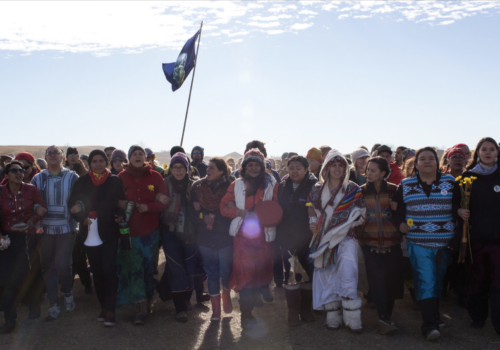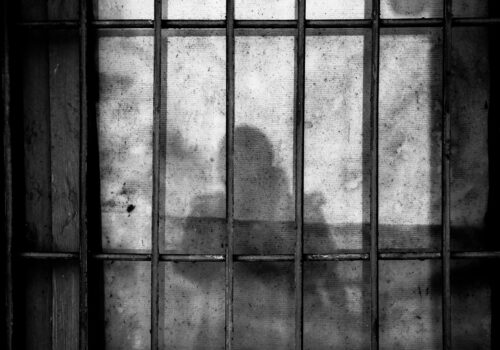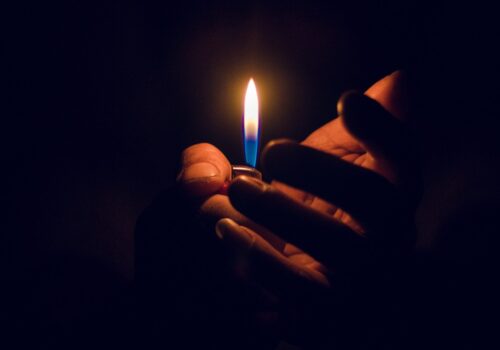Download PDF: Ott Marshall, Course Correction
Abstract
This article utilizes current research to reflect critically on earlier writing that privileged the capacity for love to discipline anger. Contemporary maternal activists demonstrate how love fuels social action when it cooperates with anger. Pairing this activism with feminist writing, the author argues that it is a mistake theologically and pragmatically to reduce love in social action to its disciplining function. Using love to control anger rather than to cooperate with it constrains love’s power to challenge and to change the status quo.
My daughter is learning to drive, which means that the phrase “course correction” is a regular feature of our family lexicon now. A course correction is an adjustment that one makes in light of changes in the road or, as is most often the case in our car, because one is drifting too far into another lane. There are many forms of and reasons for course correction, allowing it to function well as a metaphor for an argument in need of updating. This reflective essay is a course correction.
In 2008, I published a book that commended three features for progressive Christian activism in the public square. I was responding to a call for Christians on the left to be as bold as their Christian counterparts on the right. I argued that liberal and progressive Christians should indeed bring their faith into the public square, but that they should do so in a certain way: with love toward those with whom they disagree, with attention to moral ambiguity, and with a posture of theological humility. After President Trump was sworn into office in January 2017, I received an email from a man who had read the book and appreciated it at the time, but he wondered if love, moral ambiguity, and theological humility were still the right dispositions for progressive Christians in the Trump era. These dispositions discipline Christian activism at a time when the presidential administration commits violence and violation at every turn. They also restrain the anger I feel and the anger all Christians should express in the face of state-sponsored violence.
I am grateful for the opportunity to reconsider one of these dispositions in the context of this Practical Matters issue on love. For the 2008 text, I drew heavily on the work of nonviolent activists who practice love in contexts of social conflict and resistance. From their example and writing, I made a case for enacting a love that risks not being reciprocated, a love that perceives connection beneath social division, a love that insists on seeing the humanity of even those who threaten the people and commitments one holds dear. “My goal,” I wrote then, “is not to end political and religious disagreement; it is to establish the bottom line of nonviolence in thought, word, and deed.”[1] At the time, I valued the way that love provided a discipline to movements for change. I wrote appreciatively about the extent of self-preparation and training that activists undergo in order to maintain their nonviolent commitment and to practice love toward their opponents no matter what.
I am currently studying contemporary maternal activism in the context of gun violence in the U.S. These activists also practice love in the midst of conflict, but their relationship to love is strikingly different. Love drives the activism more than tempers it. These activists enter into social action and political advocacy because they have lost a loved one or because they fear losing a loved one and because they determine to express their love by advocating for legislative change. Here, love enters the public square loudly, with grief, with anger, and with resolve. Love fires up this movement rather than keeping it in check. I continue to value and appreciate the commitment to a love that perceives deep relatedness beneath division; and I see now that it is a mistake theologically and pragmatically to reduce love in social action to its disciplining function. When we use love to control anger rather than cooperate with it, we constrain love’s power to challenge and to change the status quo. That is the course correction this essay offers.
Maternal Activism
Maternal activism is a category of social action performed by people who identify as moms or mothers, who draw on that identity to fuel and explain their activism, and who deploy that identity strategically in their chosen forms of advocacy. Moms Demand Action for Gun Sense in America is the contemporary example of maternal activism that I study. “Moms” started on December 13, 2012 with a Facebook post by a white woman named Shannon Watts. After a career in public relations, Watts (then, 41) was staying home to raise her five children in Indianapolis, Indiana. On the day after the mass shooting at Sandy Hook Elementary School, Watts opened her laptop on her kitchen counter, logged into Facebook and wrote: “I started this page because, as a mom, I can no longer sit on the sidelines. I am too sad and too angry.” Facebook users responded immediately and enthusiastically to her call to “get off the sidelines” and fight the “resourceful, powerful, and intransigent gun lobby.” Volunteers founded the first local chapter three days after Watts’s post. They organized themselves in the model of Mothers Against Drunk Driving, recognizing its tremendous success as a grassroots movement that effected legislative change during the 1980s.[2] Moms Demand Action now has a chapter in every state, 700 local groups, and thousands of volunteers.[3] When she explains the immediately enthusiastic response in December 2012 and the rapid growth of the organization, Watts references “MOMentum.” Women were channeling their “fierce love” into activism realizing that their dual roles of mom and activist strengthen one another.[4] Watts writes: “When women are passionate about an issue, they do not take ‘no’ for an answer. That passion is our power; we care so much that we become unstoppable.”[5] That’s MOMentum.
I see and hear the essentialism in these quotes. Obviously, these assertions are not true for all women; nor are they untrue for all persons who do not identify as women. The language of MOMentum does not take into account the diversity of maternal experiences, ignores social location and power dynamics, and clearly conflates women and mothers. This is the kind of rhetoric that makes feminist academics either shudder or salivate depending on the argument they hope to make by referencing it. But, of course, Watts is not speaking to feminist academics keen to critique her essentialist rhetoric. Rather, she uses essentialist rhetoric to mobilize activists who are grieving and outraged. She intentionally appeals to “mothers and others” and encourages them to bring their “fierce love” into the fight for common sense gun reform.[6]
As she does in her speeches, Shannon Watts calls on women to use their strong emotions and their maternal identity to their advantage. In her new book, she draws on Rebecca Traister’s popular text, Good and Mad: The Revolutionary Power of Women’s Anger, writing:
There’s a long history of a mother’s indignation being a force for political change, and there may be times when it’s just the thing to propel you into action. Allowing yourself to feel your righteous anger about the state of the country your kids are growing up in—no matter what cause may be fueling your passion—makes you more powerful, not less. As a mom, I know you’ve had to learn how to balance anger and love. And that’s a potent recipe for getting back to the work that needs to be done anytime you find your motivation waning.[7]
Anger and love work together in this movement. They are harnessed, invited, and performed in public spaces to push relentlessly for change in legislation and in corporate behavior.
A mother’s righteous indignation, and the fusion of love and anger have all been embodied in another key figure in the Moms movement, namely Lucy McBath. McBath became a national spokesperson for Moms Demand Action after meeting Watts in 2013. She is also one of the Mothers of the Movement for Black Lives, comprised of African American women whose children have been killed by gun violence and/or police brutality. In 2012, a white man in a convenience store parking lot in Florida opened fire on a parked car carrying four African American teenagers because their music was too loud. Jordan Davis, McBath’s son, was killed. He was seventeen. Jordan was killed eight months after Trayvon Martin was murdered by George Zimmerman, and soon McBath joined other mothers in speaking out. In her book, Standing our Ground, she connects the fight for racial justice with legislative action for gun reform. She describes a culture in which “the destruction of black bodies” is a “wholly acceptable trade-off for Second Amendment freedoms” and insists that the “fight for gun law reform [is] absolutely critical to the preservation of African American lives.”[8]
Less than one month after Jordan was shot and killed, the Sandy Hook Elementary School mass shooting occurred. McBath perceived a connection between Jordan’s murder and the massacre of the elementary school children:[9]
In the weeks since my son’s death, I had been laser-focused on how laws like Stand Your Ground rendered young black men in particular vulnerable to death by firearm. I still fervently intended to challenge this law as a way to help safeguard communities of color. But now I saw that my lens would have to grow wider; my view would need to encompass a much larger target, because the massacre at Sandy Hook had nothing to do with race. The shooter and most of his victims were white. But what the Newtown shooting had in common with Jordan’s was that it, too, was made possible by our nation’s perilously lenient gun laws.[10]
As a spokesperson for Moms Demand Action, McBath tells the story of her son’s killing and advocates for particular legislative priorities; and she references her maternal identity as motivation for her political involvement. In her speeches, Lucy McBath insists that she “did not stop being Jordan’s mother when he died.” She explicitly connects her advocacy and public service to her role as Jordan’s mom. In her book, Standing Our Ground, McBath writes: “my years of parenting Jordan were not over. As his mother, I still had work to do . . . he had left me a charge to move forward in the very manner of his death.”[11] McBath has carried this charge into her new role as a U.S. Representative for Georgia’s 6th District.[12] In 2019, she was one of the central figures in three pieces of legislation moving through Congress, universal background checks, red flag laws that prohibit the sale of guns to persons determined to be a danger to themselves or others, and a spending bill that allocates $25 million for gun violence prevention research.[13]
McBath and Watts express a fusion of love and anger and then use that fusion to mobilize others and appeal for change. I highlight them not because they speak for all women advocating for common sense gun reform or for all women who have lost children to gun violence. I highlight them because they illustrate the way in which love can fuel social action when it cooperates with anger rather than seeks to discipline it. The love they illustrate is not new; nor is its connection to anger. Indeed, it is reminiscent of some feminist classics by Beverly Wildung Harrison and Audre Lorde. In her inaugural lecture at Union Theological Seminary in 1980, Harrison explained:
Christians have come very close to killing love precisely because we have understood anger to be a deadly sin. Anger is not the opposite of love. It is better understood as a feeling-signal that all is not well in our relation to other persons or groups or to the world around us. . . . Where anger arises, there the energy to act is present. . . . The important point is that where feeling is evaded, where anger is hidden or goes unattended, masking itself, there the power of love, the power to act, to deepen relation, atrophies and dies.[14]
A few years before this address, Audre Lorde wrote about the power of the erotic and the mechanics of suppression in the western tradition. She describes the erotic as the “lifeforce of women,” the creative power that arises from women’s deepest resources of knowledge.[15] She describes it as “a measure between the beginnings of our sense of self and the chaos of our strongest feelings.”[16] It is the power that arises from the place where truth is spoken. And, it is a power that Western society has taught us to suspect, vilify, and devalue.[17]
In 1981, Audre Lorde addressed the National Women’s Studies Conference with her now famous lecture titled, “The Uses of Anger: Women Responding to Racism.” She began with an assertion that she repeats throughout the lecture: “My response to racism is anger.”[18] She included several stories, and alludes to many, many more, about white women’s resistance to the anger of black women. It was crucial for Lorde to speak directly to the “grave differences” among women, given the context of the lecture and the persistence of racism within feminist spaces.[19] The lecture also communicates the power of anger, a power that is similar to the power of eros she described a few years earlier. “Focused with precision,” she says of anger, “it can become a powerful source of energy serving progress and change.”[20] Like eros, anger is loaded with information (knowledge) and with energy (power). What strikes me reading this essay again in our current context is that Lorde acknowledges fear of her own anger. She writes: “I have lived with that anger, ignoring it, feeding upon it, learning to use it before it laid my visions to waste, for most of my life. Once I did it in silence, afraid of the weight. My fear of anger taught me nothing. Your fear of that anger will teach you nothing, also.”[21] Today’s maternal activists are still trying to live into this message and to harness the power of anger for the work of love.[22]
The fact that this emotional work is ongoing underscores its significance and its difficulty. As a Christian and teacher-scholar in the field of Christian ethics, I am aware that my faith tradition and academic home have a long history (and a bad habit) of stripping love of passion. Indeed, my own writing on love in 2008 followed this pattern. That is, I wrote appreciatively about one form of love, agape, as providing the “regulating ideal” for nonviolent social movements. This language comes from Martin Luther King’s Stride Toward Freedom, and it captures the sense that disinterested, other-regarding love can temper unruly emotions and, particularly, keep anger in control. In the context of social conflict and resistance, agape calls the activists to seek the good of the opponent, in addition to the movement’s objectives, and thus to resist violence in thought, word, and deed. As part of a philosophy of nonviolent action that is both principled and pragmatic, this understanding of love functions to discipline the movement so that it will be effective in exposing the brutality of the oppressor and dismantling injustice. In King’s philosophy, agape also functioned as an adhesive in a divided society, “the only cement that can hold this broken community together.”[23] I continue to value this dimension of love as a reminder of and commitment to inter-relatedness beneath social division; and I have profound respect for the discipline and creativity of activists who pursue alternatives to violence as their means for resistance and social change. However, it is a mistake to limit the role of love in resistance to its agapic form. Such limitation is a descriptive error because love performs other functions in contexts of resistance. It is also a prescriptive error because commending love to temper unruly emotions constrains the power of love to fuel resistance.
Conclusion
Reflecting on the role of love in contemporary maternal activism, I see more clearly that nonviolent social movements have regularly used the language of love to temper strong emotions and, particularly, to keep anger under control. The underlying assumption is that anger is a threat to the discipline of the movement, a threat that love surmounts. Anger divides; love maintains relationship. Today, this same logic shapes “civil conversations,” an approach to dialogue that helps people to talk across difference by keeping strong emotions at bay. As a nonviolent activist and as a facilitator, I have enacted love in these ways to discipline myself at an action and to help myself listen to someone I would rather shut out. These disciplines of nonviolent action and of listening are crucial, and the love that perceives connection to others is essential for maintaining them. However, it is a mistake theologically and pragmatically to reduce love in social action to its disciplining function. Thus, the course correction: When we use love to control anger rather than cooperate with it, we constrain love’s power to challenge and to change the status quo.
Course corrections are not radical. This essay does not pit contemporary maternal activists against the historical tradition of nonviolent Christian activism. Nor does it reject agape for eros. It does, however, argue that the Christian propensity to control the passionate dimensions of love has driven too many Christian activists into the slow lane at a time when the U.S. presidential administration is assaulting vulnerable people and the planet. We need a course correction. By “we” here, I particularly mean those of us who are witnessing the assault, but not feeling the brunt of it. I also mean we who both sit at a distance and who hold dispassionate distance as an intellectual virtue. I also mean we who remain committed to religious and intellectual traditions that view anger as a problem. We need a course correction because dispassionate distance on this road is complicity and because controlling anger on this road is acquiescence. Those of us who hold positions of leadership in religious and academic contexts also need to do some road repair to open the lane for anger to fuel the work of love. This is long-term and complex work, to be sure. But we can begin it by doing three simple things: (1) create space for anger in our classrooms and religious/spiritual gatherings, (2) ask: “how is your anger connected to your love?” and (3) listen, really listen, to the answers.
I am reminded of an important criticism that James Cones wrote about Reinhold Niebuhr:
Despite all Niebuhr’s writing and speaking about racism, he expressed no ‘madness in his soul,’ no prophetic outrage against lynching. Even when confronted with the tragedy of the Birmingham bombing, he showed no anger. What Niebuhr said about liberalism could be applied to his own perspective on racism: Liberalism, he said, ‘lacks the spirit of enthusiasm, not to say fanaticism, which is so necessary to move the world out of its beaten tracks. It is too intellectual and too little emotional to be an efficient force in history.’[24]
What Niebuhr wrote about liberalism and what Cone wrote about Niebuhr could also be written about many white, progressive, economically-comfortable Christians today. In the face of outrageous assault, we are making the mistake of keeping our anger in check. For those of us who do this because we think love demands it, we must reckon with the ironic truth: by keeping our anger in check, we are failing in the work of love.
Notes
[1] Ellen Ott Marshall, Christians in the Public Square: Faith that Transforms Politics (Nashville: Abingdon Press, 2008), 20.
[2] Mark Follman, “These Women Are the NRA’s Worst Nightmare,” Mother Jones, September/October, 2014, accessed December 28, 2018, https://www.motherjones.com/politics/2014/09/moms-demand-action-guns-madd-shannon-watts-nra/; Shannon Watts, Fight Like a Mother: How a Grassroots Movement Took on the Gun Lobby and Why Women Will Change the World (New York: HarperOne, 2019), 6, 46.
[3] Watts, 96.
[4] Watts, 21.
[5] Watts, 26.
[6] Watts, 155.
[7] Watts, 255.
[8] Lucia Kay McBath with Rosemarie Robotham, Standing our Ground: The Triumph of Faith over Gun Violence, A Mother’s Story (New York: Simon & Schuster, 2018), 37.
[9] McBath,161.
[10] McBath, 154.
[11] McBath, 25.
[12] “About Lucy,” Lucy McBath for Congress, accessed December 28, 2018, https://lucyforcongress.com/about/.
[13] President Trump signed the spending bill on December 20th. While $25 million is still a drop in the bucket, it marks the end of a twenty-year freeze on such research.
[14] Beverly Wildung Harrison, Making the Connections: Essays in Feminist Social Ethics (Boston: Beacon Press, 1985), 14–15.
[15] Audre Lorde, “Uses of the Erotic: The Erotic as Power” in Sister Outsider: Essays and Speeches (Berkeley: Crossing Press), 55.
[16] Lorde, “Erotic,” 54.
[17] Lorde, “Erotic,” 53.
[18] Audre Lorde, “The Uses of Anger: Women Responding to Racism” in Sister Outsider: Essays and Speeches (Berkeley: Crossing Press), 124.
[19] Lorde, “Anger,” 127.
[20] Lorde, “Anger,” 127.
[21] Lorde, “Anger,” 124.
[22] See also, Brittney Cooper, Eloquent Rage: A Black Feminist Discovers Her Superpower (New York: St. Martin’s Press, 2018).
[23] Martin Luther King, Stride Toward Freedom: The Montgomery Story (New York: Harpercollins, 1987), 106.
[24] James Cone, The Cross and the Lynching Tree (Maryknoll: Orbis, 2011), 56.






